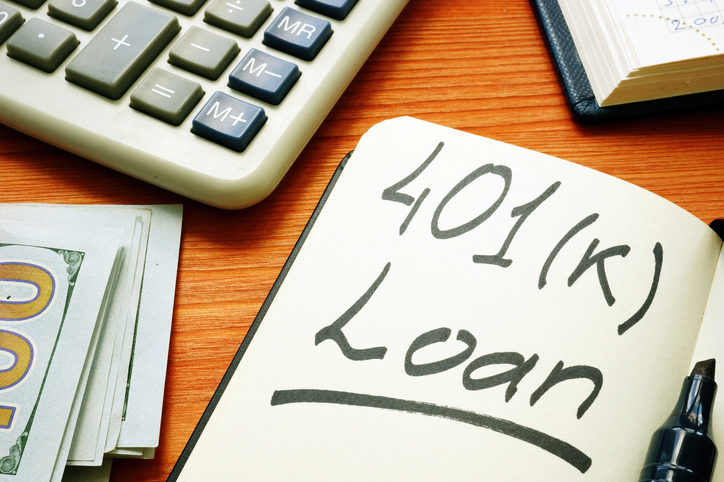How long it takes to get a 401(k) loan can vary depending on your employer, plan administrator and whether your plan offers an online portal or requires paperwork. In some cases, the process may take just a few days. In others, you may need to wait a couple of weeks before the funds hit your account. When it comes to deciding whether or not to pursue a 401(k) loan, the key is having a firm understanding of the timeline, and what could potentially delay it, especially if you’re relying on the money for an urgent expense.
A financial advisor can help you evaluate whether a 401(k) loan is right for your situation, and which alternatives might better serve your long-term financial goals.
What Is a 401(k) Loan?
A 401(k) loan gives you the option to borrow money directly from your own retirement savings rather than taking out a loan from a bank. In essence, you’re borrowing from yourself by using the funds in your 401(k) account.
Typically, you can access up to 50% of your vested balance or $50,000, whichever is lower. You pay the loan back into your own account, with interest, usually through automatic payroll deductions. And most plans require you to repay the loan within five years, though you may have longer if you used it to purchase a primary residence.
It’s worth noting that not all 401(k) plans permit loans, and those that do often include specific terms and restrictions. For this reason, it’s best to confirm the rules with your HR department or plan administrator before moving forward.
How Long Does It Take to Get a 401(k) Loan?

The time it takes to get a 401(k) loan can range from a few business days to a couple of weeks, depending on how streamlined your employer’s process is. The following are some of the timelines depending on the type of plan or approval required:
- Fast-track plans: If your plan provider offers digital processing (like Fidelity, Empower, or Vanguard), you might receive funds within 3–5 business days.
- Manual approvals: If the plan requires paper forms or employer-level authorization, the process could take 7–14 business days.
- Payment method: Direct deposit speeds things up, while a mailed check may add several days to the timeline.
How the 401(k) Loan Process Works
To better understand the timeline, it helps to know the process from start to finish. Here are the general steps involved:
- Submit a loan request: Depending on your plan, you may request the 401(k) loan online or fill out a paper form. Digital forms tend to speed up the process.
- Employer or plan administrator review: Some plans require an HR representative or plan administrator to approve the request. This step can add time depending on internal processing.
- Loan terms disclosure and agreement: You’ll receive a loan agreement outlining repayment terms, interest, and schedule. You must review and sign this before the loan can be disbursed.
- Disbursement: Funds are either directly deposited into your bank account or mailed as a check. Direct deposit typically takes 1–3 days, while mailed checks may take longer.
Factors That Can Affect the Loan Timeline
Even if your 401(k) plan allows loans, several factors can affect how quickly you receive your funds. The plan provider plays a key role, as some companies have more efficient systems than others. For example, Empower and Fidelity are known for offering streamlined online portals that can speed up the process.
Employer-specific rules may also come into play, since some workplaces add extra layers of approval or verification before releasing money. Your banking setup can make a difference as well; if you haven’t previously arranged direct deposit with your 401(k), additional verification steps may slow things down.
Finally, simple mistakes such as errors or incomplete information on your application can add days to the timeline.
Alternatives if You Need Money Sooner
If your 401(k) loan process is taking longer than expected, or your plan doesn’t allow loans at all, there may be alternatives worth exploring:
- Personal loans: While personal loan interest rates are usually higher, approval and disbursement can be much faster, often within one business day.
- Roth IRA contributions: If you have a Roth IRA, you can withdraw contributions (but not earnings) at any time without taxes or penalties.
- Home equity lines of credit (HELOCs): If you own a home, tapping into equity might be a more flexible and tax-efficient borrowing option.
- Hardship withdrawals: If you’re experiencing financial hardship, you may be able to take a 401(k) hardship withdrawal, but this comes with taxes and possible penalties.
Frequently Asked Questions (FAQs)
Do All Plans Offer 401(k) Loans?
No. While many plans do, some employers choose not to offer the loan feature. Check your Summary Plan Description or ask HR.
Does My Employer Have to Approve My Loan?
Some plans require employer or HR approval before releasing funds from your 401(k). Others allow direct authorization through the provider.
Can I Borrow More Than Once From My 401(k)?
Yes, but plans may limit the number of outstanding loans you can have at one time. Make sure to check your plan’s rules.
What If My 401(k) Loan Is Delayed?
Reach out to your plan administrator to check on the status. Delays often occur due to missing forms, outdated contact info, or employer approval lag.
Bottom Line

Most 401(k) loans are processed within a week, especially if your plan supports online applications and direct deposit. However, paperwork, approval requirements and mailing delays can stretch the timeline to two weeks or more. If you’re considering borrowing from your retirement funds, it’s worth taking time to understand your plan’s rules and potential delays.
Tips for Retirement Planning
- A financial advisor can help you weigh the pros and cons of a 401(k) loan and explore other funding options that may protect your long-term retirement goals. Finding a financial advisor doesn’t have to be hard. SmartAsset’s free tool matches you with vetted financial advisors who serve your area, and you can have a free introductory call with your advisor matches to decide which one you feel is right for you. If you’re ready to find an advisor who can help you achieve your financial goals, get started now.
- Before taking out a loan, make sure you understand how it’s going to be repaid. Additionally, consider using a 401(k) calculator to help you know what your account could be worth if you make this decision or not.
Photo credit: ©iStock.com/designer491, ©iStock.com/Inside Creative House, ©iStock.com/Dilok Klaisataporn
Read the full article here
















